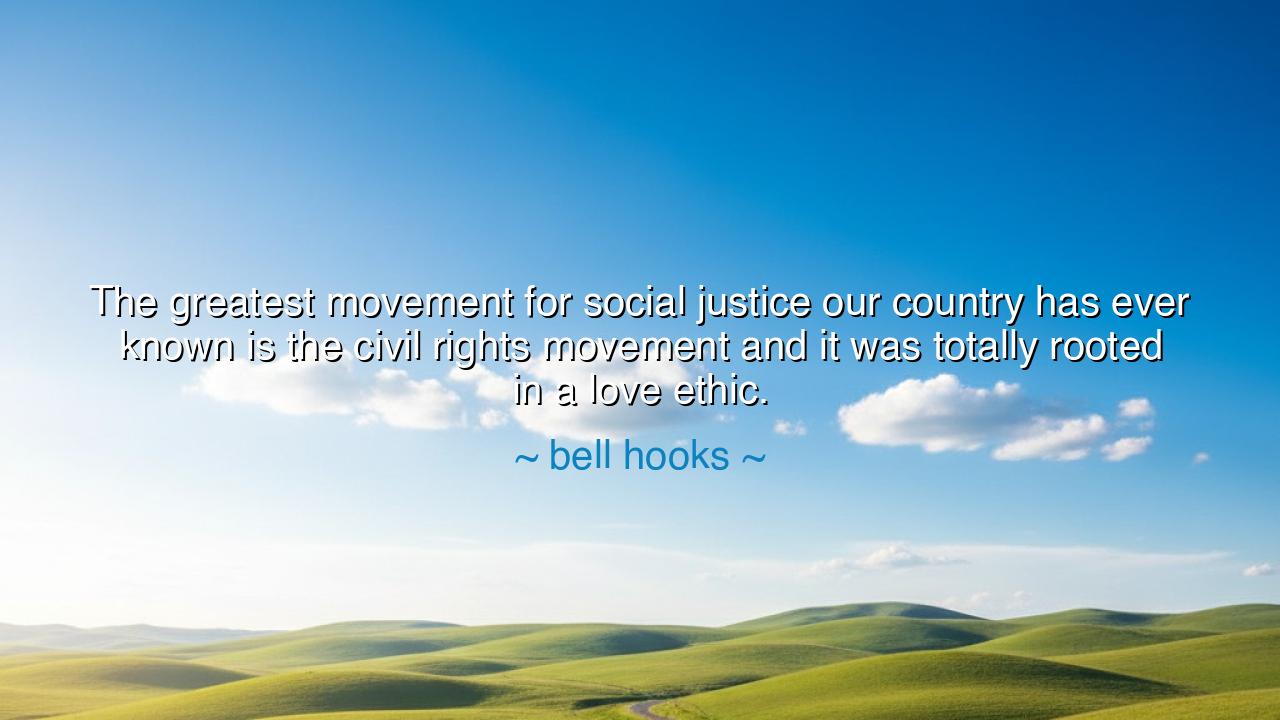
The greatest movement for social justice our country has ever
The greatest movement for social justice our country has ever known is the civil rights movement and it was totally rooted in a love ethic.






"The greatest movement for social justice our country has ever known is the civil rights movement and it was totally rooted in a love ethic." — thus spoke bell hooks, the wise teacher of compassion and resistance. Her words are not merely an observation of history but a revelation of moral truth: that love, when made fierce and fearless, becomes the most transformative force in the world. The civil rights movement, she reminds us, was not only a struggle of laws and protests, but a spiritual uprising — a revolution of the heart. It was not born of hatred, though it rose against hate; it was born of love, that sacred power which sees the humanity even in one’s oppressor and fights not for vengeance, but for freedom that includes all.
In speaking of a love ethic, bell hooks invokes a way of living, not a fleeting sentiment. Love, in her vision, is not soft or submissive — it is active, disciplined, and just. It requires courage to love when the world teaches fear, to forgive when the world demands revenge, and to stand firm in compassion when cruelty surrounds you. The civil rights leaders understood this truth. They marched and sang not because they hated the enemy, but because they loved justice more than comfort, loved freedom more than safety, and loved their people more than their own lives. Their love was militant, enduring, and creative — the kind of love that refuses to let evil define the soul.
Consider the towering figure of Dr. Martin Luther King Jr., who stood at the center of that movement like a prophet of old. He preached that “hate cannot drive out hate; only love can do that.” To many, this sounded naïve — how could love defeat the snarling dogs, the bombs, the burning crosses? But King knew what bell hooks later articulated: that love is the most radical weapon of all, for it breaks the cycle of destruction and redeems even the heart of the enemy. In the face of violence, he held fast to the philosophy of agape — unconditional love, love as will, love as moral power. It was this love that filled the streets with courage, that turned suffering into dignity, and that bent the arc of history toward justice.
The origin of hooks’ quote lies in her lifelong teaching that love must be at the center of any struggle for liberation. She saw how movements often falter when they forget this — when anger consumes the vision, when resentment replaces care. To her, the civil rights movement was the highest expression of love in public life: not a sentimental love, but a love that demands truth, accountability, and solidarity. It was a movement that insisted on seeing the humanity of every being — even those who spat, who struck, who jailed and humiliated. That, she believed, is the true test of moral evolution: to fight fiercely for justice while refusing to surrender one’s capacity to love.
Yet love in such a context is not weakness — it is heroism. It is easy to strike back when struck; it is divine to stand with open heart while demanding the impossible. Think of Rosa Parks, whose quiet act of defiance ignited the fire of a nation. She did not act out of hatred but from the conviction that all humans deserve dignity. Her stillness was filled with love — not romantic or gentle, but righteous, steady, and powerful. It was the love of self-respect and of the sacred worth of all creation. Such love terrifies tyrants, for it cannot be conquered.
From this, we learn that justice without love becomes vengeance, and love without justice becomes complacency. The ancients would have called this balance the “golden mean” — the harmony of power and compassion. bell hooks teaches that every generation must rediscover this harmony anew. To build a better world, we must root our activism, our politics, and our daily lives in love that seeks connection, not domination; healing, not harm. True social justice is born not from anger alone, but from the understanding that the liberation of one soul is bound to the liberation of all.
So, my children, take this teaching to heart: Let love be the foundation of your struggle. When you protest, let it be out of love for what humanity could be. When you speak against injustice, let it be with the strength of compassion, not the poison of hate. Love with discipline; love with clarity; love so deeply that you become unshakable in the face of cruelty. For it is love — not power, not wealth, not fear — that rebuilds nations and redeems hearts.
And remember this final truth: when bell hooks spoke of the love ethic, she was not describing the past, but calling forth the future. The civil rights movement was a great flame, but its fire has not gone out. It burns in every act of kindness that defies division, in every voice that speaks truth with compassion, in every soul that chooses mercy over malice. To walk in love is the most revolutionary act of all — for through love, humanity becomes divine.






AAdministratorAdministrator
Welcome, honored guests. Please leave a comment, we will respond soon